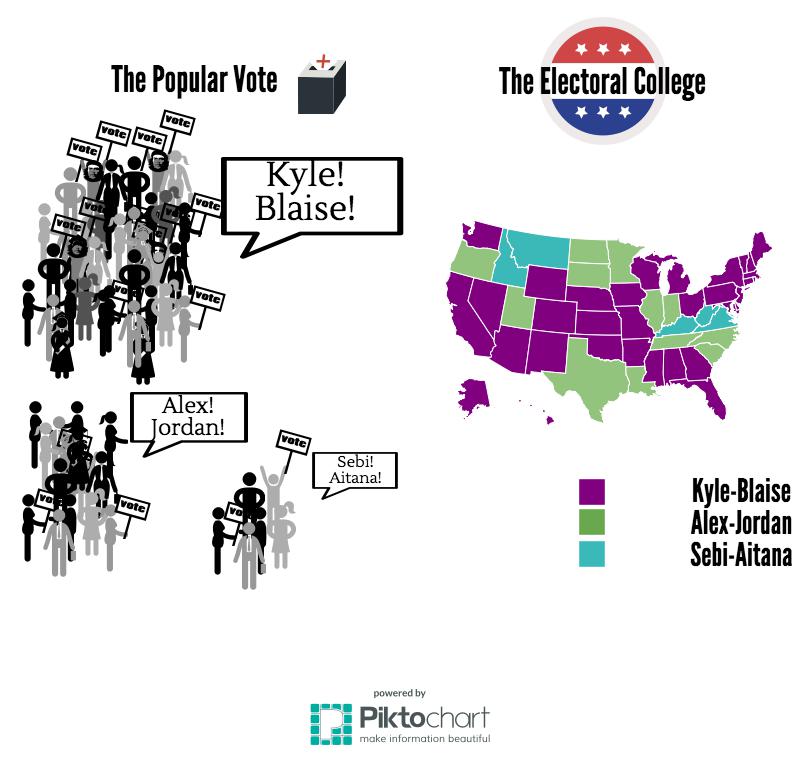The Dacha—ISU’s cabinet meets to discuss a wide range of issues, ranging from a charity soccer game to the GIN conference. It’s a warm-ish tuesday afternoon and our ISU Presidents, Kyle Macmillan and Blaise Malley arrive to find their seats occupied. They have a laugh and sit down at the other side of the table. Whispers dashed across the room as one member had the floor. Among them was ISU President Kyle asking me about a novel idea: Changing the upcoming cabinet elections’ system to an electoral college system.
Presently, all elections in ISU function with a first-past-the-post system, or winner takes all. Upon receiving the largest amounts of votes, a candidate is elected. That is how I was brought to office, that is how our Presidents, Treasurer, Secretary and other ISU members were brought to office too. It’s very simple: obtain the most votes and you win.
ISU discussed adopting the system of an electoral college. ISU President Blaise Malley justified the idea saying:
“the basic idea is that it can level the playing field with regards to the inherent disadvantages that come with a candidate that is in a grade with a smaller amount of students.”
Story continues below advertisement
This is a big issue. Between the largest and smallest grade in the Upper School (the ISU electorate), there is a 17-person difference, which can decide an election on its own. To eliminate this discrepancy, the leaders looked to this country’s controversial electoral system which brought George W. Bush to office despite losing the popular vote: The electoral college. In the electoral college in the United States, the candidate who wins has obtained the most electors. For every state, there is a certain number of electors based on the amount of members of congress. If that’s not clear to you, Salman Khan explains it fairly well in the video link attached.
At WIS, ISU decided that the equivalent to states would be homerooms. However, different from the United States, “all homerooms will be equal,” says Malley. So all homerooms will have the same amount of electors, an amount which has yet to be determined, ISU President stated. Proponents say that the equality in electors between homerooms makes sense since all homerooms are about the same size (generally with 9-12 people). This also means ISU Presidential hopefuls will have to be more tactical. They may try to win the popular vote but that no longer guarantees a victory. Proponents, like President Macmillan also believe it will level the playing field between graduating classes’ discrepancy in size. While the class of 2017 (the juniors) is this year’s electoral behemoth, it’s power as a bloc will be diminished to—in practice—benefit the class of 2019 (the freshmen).
The idea for the electoral college enjoyed unanimous support in the first ISU meeting on the issue (even though 10th grade representative Henry Asher did need to be persuaded). President Malley is confident that the administration will implement the plan, which requires constitutional revision, saying: “our hope is that it is implemented in time for the next cabinet elections.”
However, the co-Presidents hope this can be applied to not just the Presidency, but also all cabinet positions (Spirit Coordinator, Secretary and Treasurer). Though, it will not be applied for representatives, who, like in the United States, will continue to be elected by popular vote.
UPDATE: In a second meeting, fervent opposition to the idea was delivered by junior class representatives, some of whom approved of the idea in the previous session. ISU President Kyle Macmillan has vowed to bring the issue to a vote and move forward on it for the upcoming elections.
By Henri-Nicolas Grossman


































































